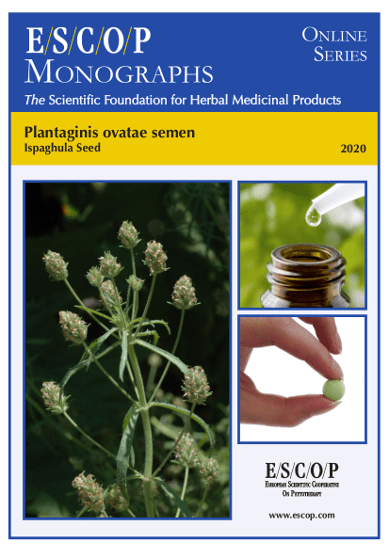
Plantaginis ovatae semen
Ispaghula seed
Plantago ovata Forssk. (Plantago ispaghula Roxb.)
Published 2020
Format: PDF
Online viewing (for only €30 per year, you can view online all the monographs; free for members of societies belonging to ESCOP)
SUMMARY
The herbal monograph selects and summarises scientific studies and textbooks regarding efficacy, dosage and safety to support the therapeutic uses of ispaghula seed.
This herbal drug by definition consists of the dried ripe seeds of Plantago ovata Forssk. (Plantago ispaghula Roxb.).
Its main characteristic constituents are mucilage polysaccharides (insoluble fibre) and highly branched arabinoxylans.
The therapeutic indications are occasional constipation, anal fissures, haemorrhoids, irritable bowel syndrome or diarrhoea.
Administration of ispaghula seed addresses posology; its duration of use; contra-indications; special warnings; special precautions for use; interactions with other medicinal products; other forms of interaction; in pregnancy and lactation; its effects on ability to drive; undesirable effects; overdose.
An in vitro experiment with ispaghula seed demonstrated a bulk-forming laxative effect. In vivo experiments with ispaghula seed or ispaghula husk, also demonstrated its effect as a bulk-forming laxative, as well as having metabolic and mucosa-protective properties.
Pharmacological studies in humans concerned laxative effects, lipid lowering, metabolic and hypoglycemic activities in healthy volunteers or in patients with hypercholesterolemia, with constipation, postgastrectomy (dumping syndrome) or with non-insulin dependent diabetes.
Controlled clinical studies with ispaghula seed or ispaghula husk demonstrated its use as a laxative and in acute or chronic diarrhea, such as for increasing stool frequency in patients with habitual constipation, especially with haemorrhoids, anal fissures, abscesses, bedridden, or anal operations and for normalizing stool frequency in irritable bowel syndrome, diarrhoea and Crohn’s disease.
Pharmacokinetics of orally administered fibre of ispaghula seed showed that it is resistant to digestion in the upper intestinal tract. Although not absorbed, part of the fibre is degraded by colonic bacteria in the lower intestinal tract to short-chain fatty acids, methane or carbon dioxide.
Safety data were assessed in human studies, where gaseous distension, occasional abdominal pain and slight nausea were reported, which disappeared on continuation of treatment. The selection of literature cited in the monograph is aimed at bringing together relevant information about the possible physiological roles of ispaghula seed or ispaghula husk and their major constituents.
KEYWORDS
- Plantaginis ovatae semen
- Ispaghula seed
- Plantago ovata Forssk (Plantago ispaghula Roxb.)
- Digestive disorders
- Occasional constipation
- Anal fissures
- Haemorrhoids
- Irritable bowel syndrome
- Diarrhoea
European Scientific Cooperative On Phytotherapy. ESCOP monographs The Scientific Foundation for Herbal Medicinal Products. Online series. Plantaginis ovatae semen (Ispaghula seed). Exeter: ESCOP; 2020.
